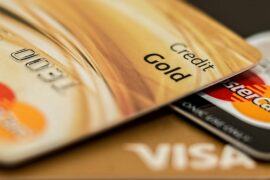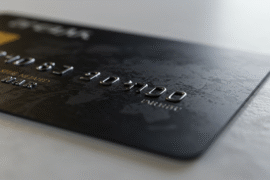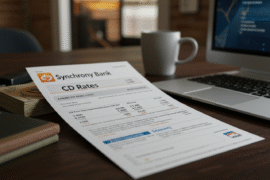This article may contain references to products or services from one or more of our advertisers or partners. We may receive compensation when you click on links to those products or services. Nonetheless, our opinions are our own.
The information presented in this article is accurate to the best of our knowledge at the time of publication. However, information is subject to change, and no guarantees are made about the continued accuracy or completeness of this content after its publication date.
Managing personal finances goes beyond budgeting and saving—making informed decisions contributing to long-term financial stability. A common question many people ask is:
- Does opening a checking or savings account affect your credit score?
- Understanding Credit Scores: What Matters Most?
- How Checking and Savings Accounts Indirectly Affect Credit
- Hard Inquiries: When a Bank Account Might Affect Credit
- Smart Banking Habits That Support Strong Financial Health
- Choosing the Right Account Without Hurting Credit
- Final Thoughts
- Frequently Asked Questions
- Recommended Reads
Does opening a checking or savings account affect your credit score?
Many assume that having a bank account influences their credit score, but the reality is more complex. While checking and savings accounts do not directly affect credit scores, how they are managed plays a significant role in financial health.
This article explores the connection between bank accounts and credit scores, dispels common misconceptions, and provides practical guidance for managing finances effectively.
Understanding Credit Scores: What Matters Most?
A credit score is a numerical representation of financial reliability. It determines eligibility for loans, credit cards, and rental agreements. Several key factors influence credit scores:
- Payment History (35%) – Reflects whether bills are paid on time.
- Credit Utilization (30%) – Measures the percentage of available credit used.
- Length of Credit History (15%) – Considers how long credit accounts have been active.
- Types of Credit (10%) – Evaluates the variety of credit accounts, such as credit cards, mortgages, and personal loans.
- Recent Credit Inquiries (10%) – Assesses the number of new credit applications within a short period.
Because checking and savings accounts do not involve borrowing, they are not reported to credit bureaus. However, managing these accounts can influence financial stability, particularly by preventing overdrafts and ensuring bills are paid on time.
How Checking and Savings Accounts Indirectly Affect Credit
While these accounts do not directly contribute to credit scores, they are financial tools supporting responsible money management. A well-maintained account helps prevent mistakes that could harm creditworthiness.
- Improved Money Management – A checking account assists with tracking expenses, avoiding overdrafts, and ensuring bills are paid on time, reducing the likelihood of late payments on credit accounts.
- Financial Security – A savings account provides a cushion, minimizing the need to rely on credit cards or loans during emergencies.
- Lower Credit Utilization – Consistently saving money can reduce dependence on credit, leading to a lower credit utilization ratio, an essential factor in credit score calculations.
Responsible management of these accounts supports financial discipline, leading to better credit-related decisions.
Voted "Best Overall Budgeting App" by Forbes and WSJ
Monarch Money helps you budget, track spending, set goals, and plan your financial future—all in one app.
Get 50% OFF your first year with code MONARCHVIP
Hard Inquiries: When a Bank Account Might Affect Credit
Opening a checking or savings account typically does not impact credit scores, but certain banking actions may result in a hard inquiry on a credit report. This usually happens when:
- Applying for overdraft protection, which is considered a form of credit.
- A bank performs a hard credit check as part of its risk assessment when opening an account.
A hard inquiry can cause a temporary dip in a credit score, but its effect is usually minor and short-lived.
If maintaining a strong credit score is a priority, it is advisable to avoid opening multiple accounts within a short period. It is always best to check with a bank to determine whether a hard or soft inquiry will be performed before applying.
Smart Banking Habits That Support Strong Financial Health
Even though checking and savings accounts do not directly affect credit scores, establishing sound financial habits can contribute to better financial stability and indirectly benefit credit.
- Regularly Review Account Activity – Tracking transactions helps prevent overdrafts and detect fraudulent activity early.
- Maintain an Emergency Fund – A well-funded savings account reduces reliance on credit during unexpected expenses.
- Use Automatic Payments – Setting up bill payments through a checking account helps ensure due dates are not missed for credit cards and loans.
- Leverage Budgeting Tools – Many banks provide financial planning features to track spending and set savings goals.
Adopting these habits helps maintain financial stability and prevents costly errors that could negatively affect credit.
Choosing the Right Account Without Hurting Credit
Selecting a checking or savings account that aligns with financial goals is essential for effective money management.
Factors to Consider When Opening a Bank Account
- Monthly Fees – Choosing an account with low or no maintenance fees prevents unnecessary costs.
- Overdraft Protection Policies – Some banks charge high overdraft fees, making understanding the terms essential.
- ATM and Online Banking Access—It is beneficial to ensure easy access to funds through a wide ATM network and digital banking services.
- Account Requirements – Some accounts require minimum balances to avoid fees, which may not be suitable for all financial situations.
Reviewing these factors before selecting an account helps prevent unnecessary fees and supports smarter financial decisions.
Final Thoughts
Opening a checking or savings account does not directly impact credit scores, but managing these accounts can influence overall financial well-being. Maintaining sufficient funds, tracking spending, and avoiding unnecessary inquiries are essential to building a strong financial foundation.
Smart banking choices help prevent financial setbacks and contribute to long-term economic success.
Frequently Asked Questions
Will opening a checking or savings account impact a credit score?
No. These accounts are not reported to credit bureaus and do not directly influence credit scores.
Does applying for a checking or savings account involve a credit check?
It depends on the bank. Most institutions perform a soft inquiry, which does not affect a credit score. However, a hard inquiry—such as when applying for overdraft protection—may cause a temporary, minor dip in a score.
Can maintaining a checking or savings account help improve credit?
Not directly, but responsible financial management—such as avoiding overdrafts and ensuring timely payments—supports overall financial stability, which can benefit creditworthiness over time.
Do negative balances in checking accounts affect credit scores?
A negative balance alone does not impact credit. However, if the account is closed due to an unpaid balance and the debt is sent to collections, it can harm a credit score.

Reviewed and edited by Albert Fang.
See a typo or want to suggest an edit/revision to the content? Use the contact us form to provide feedback.
At FangWallet, we value editorial integrity and open collaboration in curating quality content for readers to enjoy. Much appreciated for the assist.
Did you like our article and find it insightful? We encourage sharing the article link with family and friends to benefit as well - better yet, sharing on social media. Thank you for the support! 🍉
Article Title: How Opening a Checking or Savings Account Affects Your Credit Score
https://fangwallet.com/2025/03/21/savings-account-and-credit-score/The FangWallet Promise
FangWallet is an editorially independent resource - founded on breaking down challenging financial concepts for anyone to understand since 2014. While we adhere to editorial integrity, note that this post may contain references to products from our partners.
The FangWallet promise is always to have your best interest in mind and be transparent and honest about the financial picture.
Become an Insider

Subscribe to get a free daily budget planner printable to help get your money on track!
Make passive money the right way. No spam.
Editorial Disclaimer: The editorial content on this page is not provided by any of the companies mentioned. The opinions expressed here are the author's alone.
The content of this website is for informational purposes only and does not represent investment advice, or an offer or solicitation to buy or sell any security, investment, or product. Investors are encouraged to do their own due diligence, and, if necessary, consult professional advising before making any investment decisions. Investing involves a high degree of risk, and financial losses may occur including the potential loss of principal.
Source Citation References:
+ Inspo
There are no additional citations or references to note for this article at this time.












































